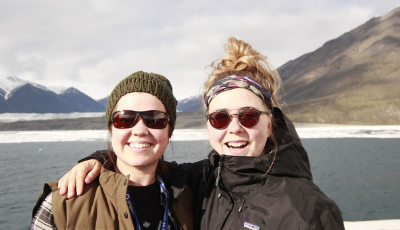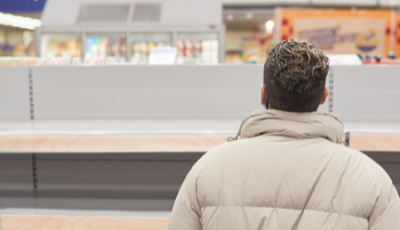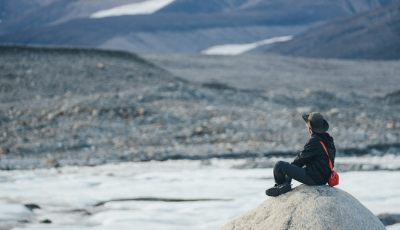
Marie Wilson, Commissioner, Truth and Reconciliation Commission of Canada, 2009-2015
The Bridge…I love the title of this publication! It is the perfect perspective for this online initiative of Students on Ice. The bridge is, after all, that part of the ship where we get the widest and longest perspective both of what is immediately before us, and what is looming ahead. I think recent events make plain that what is immediately before us, with ever increasing urgency, is the need to get to know, understand and respect each other better across cultures, especially Indigenous and non-Indigenous. What is looming ahead, unless things change, is a world facing racial and climate calamity, overwhelmed with social inequities, environmental degradation and related health emergencies that undercut lives and livelihoods.
SOI has contributed to deepening our understanding of how these facts are inter-related. The stunningly beautiful Arctic environments of SOI expeditions are home to diverse Inuit peoples, defined in their very names by their relationship with the natural world. They carry deep knowledge of their homelands as ecosystems of interdependency, and as natural, early warning systems for when things are off balance. They continue, as they have for decades, to alert the world to the critical state of climate disruptions, and to challenge us all to live up to our shared human responsibilities to Mother Earth, and to each other.
2017 was a banner year for Students on Ice, and its sister initiative known as Canada C3. I was lucky to be part of that. I was drawn in by the title…C3…Coast to Coast to Coast. Living in the Northwest Territories as I have for well over half of my life now, I have been a long-time advocate of including that third, Arctic coast in our national identity, the one ignored in Canada’s official motto, ‘From Sea to Sea’. That’s not the only thing missing in our national identity. We began our leg of Canada C3 in Charlottetown on the 150th anniversary of Canada Day. We were welcomed by local Indigenous chiefs. Then we were shown pictures of the original, all white and male, ‘Fathers of Confederation”. We were left asking ourselves, ‘who is missing from this picture?’ Today, National Indigenous Day 2020, we are facing the same provocative picture of ourselves as a country, with the rising voices of Indigenous peoples who feel they are still out of the picture of the good things Canada has in store. We are in the promised time of reconciliation…and yet there is still such a long way to go. Why is that?
The greatest honour of my life was serving as one of three Commissioners for the Truth and Reconciliation Commission of Canada from July 2009 through to December 2015. Today, in 2020, the greatest question facing me, and everyone else who is paying attention, is whether Canada truly intends to implement the findings of our historic work.
As a reminder, Canada’s residential school system for Indigenous children was in place for over a century as imposed, official government policy, with the last schools closing in the late 1990’s. Eighty thousand former student survivors of that system later took the Government of Canada, and the churches who ran the schools, to court. The survivors won a massive settlement (IRSSA-2006), and fought to have a truth and reconciliation commission as part of that deal, so that their voices could be heard and they could begin to heal in the process. They also wanted the rest of the country to learn about this part of its own history of institutionalized racism, with impacts of substandard education, widespread child abuses of all kinds, and thousands of child deaths.
As TRC Commissioners, we criss-crossed the country, north-south, east-west, amassing detailed statements from almost seven thousand people who voluntarily came forward to record the experiences of their childhoods spent in residential schools, usually far away from family, community and familiarity of any kind, and the consequences of those experiences on their adult lives. It remains the largest oral history project ever in Canada. Our TRC obligation was to document and preserve that history and its legacy, to educate the country about it, and to inspire reconciliation as an “ongoing individual and collective process” for all Canadians. We intentionally did our work in a visible and noisy way, teaching as we went, and directing our conclusions to all levels of government and all sectors of society.
That was five years ago. At the time we stressed that certain of our Calls to Action were highest priority, in particular, #53, to establish a National Council for Reconciliation. This would become a critical, independent agency for tracking our progress as a country, maintaining the momentum for ongoing reconciliation, and holding up an honest mirror to ourselves for where we are still far off course. Through annual reports to the nation, we would know if we are we actually getting any better at ensuring Indigenous kids grow up in their families and cultures, live in safety from violence, get good medical care and a good education, have fair opportunities for good jobs, and are treated fairly and respectfully by fellow citizens, police and the justice system. But how would we know if we aren’t paying attention to these things, if we aren’t tracking and measuring what counts, if we aren’t listening to the wisdom of seven thousand survivors who told us they need such changes, if we aren’t following the route to reconciliation and positive change that they have charted for us?
Today we still do not have that National Council for Reconciliation, so we are already five years behind in giving ourselves an honest annual progress report. From where I stand, it is clear from the Bridge that what was already urgent five years ago is now critical today. We cannot allow ourselves to get distracted, fogged in or stalled. To honour National Indigenous Day with respect, heart and purpose, we need to keep our vision clear, and our commitment to meaningful changes well-fuelled. We need to hold our leadership to account for delivery on the Calls to Action, and we need to continue to ask ourselves, ‘where do I fit in the ongoing individual and collective process of reconciliation?’
DISCOVER MORE
How to meaningfully participate in conservation as a young person
Being a young person trying to break into the conservation world can be intimidating. While there are many opportunities out there, a lot of youth...
When Tiktok Leads to Food Donations
Kyra Flaherty, SOI Arctic 2016 Alum, and tourism development coordinator with the Nunavut government experienced a flash of internet fame when her...
Climate Action Cohort Reflections
Focused on building climate leaders, the CAC brings together 10 Canadian youth alumni each year to bridge the gaps between policy decisions,...



